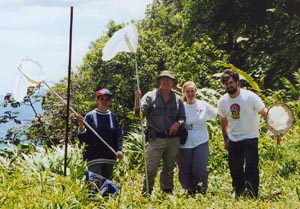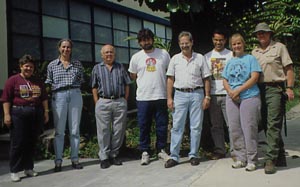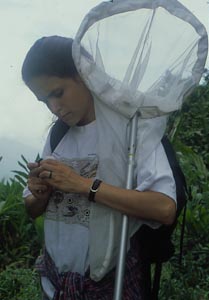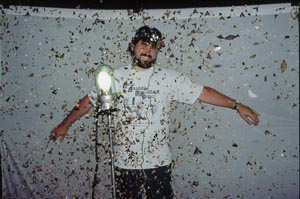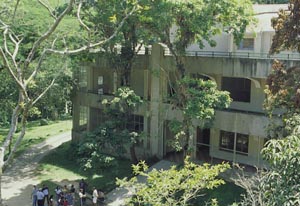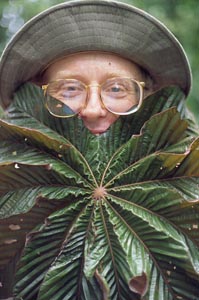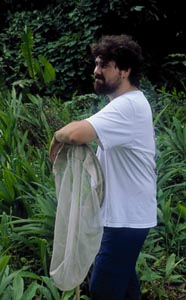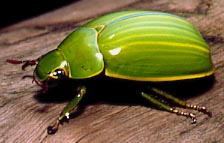
. |
.
Team
Scarab in Venezuela
June 1999
Brett Ratcliffe and Mary Liz Jameson
|
| . |
Scarab beetles can be found in nearly every earthly habitat, but
they are most abundant in the ever-wet, tropical rainforests where
humming mosquitoes abound and stagnant air, ripe with the scent
of fermenting fruits, rotting vegetation, and monkey dung, permeates
the forest.
This year Team Scarab in the Division of Entomology (Drs. Brett
Ratcliffe and Mary Liz Jameson and their graduate students, Andrew
Smith and Karla Villatoro) traveled to Venezuela in search of tropical
scarab beetles. In June we conducted research and collaborated with
colleagues at the entomology museum at the Universidad Central de
Venezuela in Maracay. While there, Dr. Ratcliffe gave a seminar
(in Spanish) about his research on scarab beetles in Costa Rica
and Panama.
|
|
| . |
|
|
...... |
|
More
than just birds and insects migrate to Portacheulo Pass - so do
entomologists!
Team Scarab from left to right:
Karla Villatoro, Brett Ratcliffe, Mary Liz Jameson, Andrew Smith.
Photo by obliging tree stump. |
|
The
faculty at the Universidad Central de Venezuela in Maracay kindly
hosted our visit to Venezuela. Left to right: Nereida Delgado,
Vilma Savini, Carlos Julio Rosales, Andrew Smith, Luis Joly, Hermes
Escalona, Mary Liz Jameson, Brett Ratcliffe.
Photo by Karla Villatoro. |
.. |
|
|
| We
spent 21 days in Venezuela and explored several spectacular habitats,
all of which were rich with scarabs. Destinations included ever-wet
cloud forest in the northern-most Andes mountains (home of the rare
spectacled bear), cold and windy paramo grassland above treeline
at 3000 meters elevation, dry chaparral forest with tall, hairy
cacti and thorny trees, and mid-elevation rainforest where the gray,
coastal clouds swept in and delivered a daily rain shower. Major
collecting localities were Parque Nacional Sierra Madre, Parque
Nacional Guaramacal, Parque Nacional Yacambu, and Parque National
Henri Pittier. Our favorite location was Portacheulo Pass, an area
where the insects migrated from the northern lowland habitats over
a low ridge to the southern lowland habitats. Here we saw an abundance
of migrating butterflies and beetles that were all funneled into
a narrow pass. It was incredible! Swarms of rainbow-colored butterflies
and insects struggled uphill against the wind and floated in the
air like dazzling ornaments. Species new to science and observations
that have never been recorded are always part of a trip to the tropics.
Now we are curating and identifying the specimens, and we will begin
to unravel some of nature's mysteries. |
| .. |
....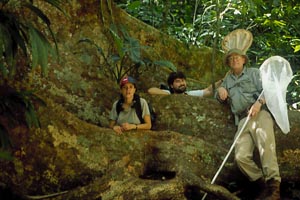 ...... ...... |
|
|
Karla
Villatoro, Andrew Smith, and Brett Ratcliffe among the buttresses
of a forest giant at Henri Pittier National Park.
Photo by Mary Liz Jameson.
. |
|
Karla
Villatoro intent on indentifying the insect that she has just
captured at Portacheulo Pass,
Henri Pittier National Park.
Photo by Brett Ratcliffe. |
.. |
|
|
|
|
|
Andrew
Smith demonstrating a new
and effective collecting techinque at Portacheulo Pass.
Photo by Mary Liz Jameson. |
|
Estacion
Rancho Grande in Henri Pittier National Park. Photo by Mary Liz
Jameson.
.
. |
.. |
|
|
|
|
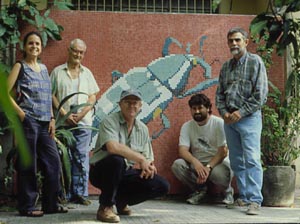 |
Scarab
fever affects all of us differently. Here, Brett Ratcliffe demonstrates
one of the side effects. Photo by Mary Liz Jameson.
.
.
. |
|
Beetle
aficionado Carlos Bordon (Maracay, Venezuela) features his favorite
group, the weevils. Left to right: Karla Villatoro, Carlos Bordon,
Brett Ratcliffe, Andrew Smith,
and Dr. Clavijo.
Photo by Mary Liz Jameson. |
.. |
|
|
|
|
|
Andrew
Smith pondering the big cetoniine scarab that just got away.
Photo by Brett Ratcliffe. |
|
Platycoelia
flavostriata (Latreille) closely mimics the VW bug.
Photo by Mary Liz Jameson. |
........
|
|
|
![]()
![]()



